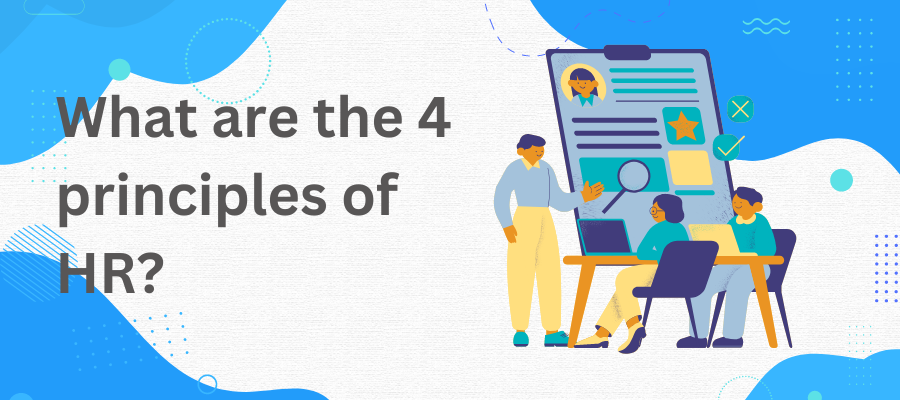What are the 4 principles of HR?
In today’s ever-changing business landscape, human resources (HR) plays a crucial role in shaping the success of organisations. HR professionals are responsible for managing the most valuable asset of any company – its people. To effectively carry out this responsibility, HR teams adhere to four key principles that guide their actions and decisions.
Understanding the Role of Human Resources
Before we delve into the principles that underpin HR practices, it’s important to understand the evolution of HR in business. In the past, HR was primarily known for handling administrative tasks, such as payroll and benefits. However, over the years, the function of HR has evolved significantly to become a strategic partner in driving organisational success.
Today, the modern HR department encompasses a wide range of responsibilities, including talent acquisition, employee development, performance management, and employee relations. By aligning HR strategies with overall business goals, companies can gain a competitive edge in the market.
The Evolution of HR in Business
As businesses grappled with the need to attract and retain top talent, the role of HR expanded beyond administrative duties. HR professionals began to focus on strategic management, recognising that effective HR practices could contribute to a company’s long-term growth and success.
This shift in mindset led to the emergence of the modern HR department, where professionals are involved in shaping the organisation’s strategy, culture, and employee experience. By understanding the historical context of HR, we can now explore the four principles that form the foundation of HR practices.
One of the key principles of HR practices is talent acquisition. HR professionals play a crucial role in identifying and attracting top talent to the organisation. They utilize various recruitment strategies, such as job postings, networking, and partnering with educational institutions, to find the right candidates for the job.
Once the talent is acquired, the next principle is employee development. HR professionals design and implement training and development programs to enhance employees’ skills and knowledge. These programs can include workshops, seminars, online courses, and mentoring programs.
Performance management is another important principle of HR practices. HR professionals establish performance goals and objectives for employees and provide regular feedback and evaluations. They also play a role in recognising and rewarding high performers, as well as addressing performance issues and providing support for improvement.
Employee relations is the final principle that forms the foundation of HR practices. HR professionals are responsible for fostering a positive and productive work environment. They handle employee grievances, mediate conflicts, and ensure compliance with labor laws and regulations.
By incorporating these four principles into their practices, HR departments can contribute to the overall success of the organisation. They help attract and retain top talent, develop employees’ skills, ensure high performance, and maintain positive employee relations.
In conclusion, the role of HR has evolved from handling administrative tasks to becoming a strategic partner in driving organisational success. By understanding the historical context and principles of HR practices, companies can leverage their HR departments to gain a competitive edge in the market and create a positive work environment for their employees.
The First Principle: Strategic Management
Strategic management is a crucial principle that guides HR professionals in their decision-making process. It involves aligning HR strategies with the company’s overall strategic goals. By doing so, HR ensures that its initiatives and programs are directly linked to driving business success.
The Importance of Strategic Management in HR
When HR is integrated into strategic planning, it becomes a proactive force that can anticipate and address future business needs. Strategic management enables HR to identify talent gaps, develop succession plans, and ensure that the organisation has the right people in the right roles at all times.
Additionally, by aligning HR with strategic goals, HR professionals can effectively communicate the value they bring to the organisation. This helps to establish HR as a strategic partner, rather than just a support function.
Implementing Strategic Management in HR
Implementing strategic management in HR involves a structured approach that starts with understanding the company’s overall strategy. HR professionals need to have a deep understanding of the organisation’s goals, values, and culture to align HR initiatives accordingly.
By conducting thorough workforce analysis, HR teams can identify talent gaps and develop strategies to attract, develop and retain the right individuals. This may involve creating targeted recruitment campaigns, implementing training and development programs, and designing compensation and reward systems that incentivise high performance.
The Second Principle: Workforce Planning and Employment
A crucial aspect of HR’s role is ensuring that the organisation has the right people in the right positions. Workforce planning and employment is the second principle that underpins HR practices.
The Role of Workforce Planning in HR
Workforce planning involves anticipating future workforce needs and developing strategies to meet those needs. HR professionals need to understand the internal and external factors that impact the demand and supply of talent within the organisation.
By conducting thorough workforce planning, HR can identify potential talent shortages or surpluses, and implement strategies to mitigate any risks. This may involve succession planning, talent acquisition initiatives, or workforce restructuring.
How Employment Decisions Impact the Organization
Employment decisions have a significant impact on the organisation’s performance, culture, and overall success. HR plays a key role in ensuring that the hiring process is fair, transparent, and aligned with organisational goals.
By implementing effective recruitment and selection practices, HR professionals can attract and onboard top talent, creating a diverse and high-performing workforce. Additionally, HR ensures compliance with legal and ethical standards, minimising the risks associated with employment-related issues.
The Third Principle: Human Resource Development
Employee development is vital for fostering a culture of continuous learning and growth within an organisation. The third principle of HR revolves around human resource development, which involves providing employees with the necessary skills and knowledge to succeed in their roles.
The Need for Continuous HR Development
In today’s fast-paced business environment, organisations need to adapt quickly to technological advancements and changing market conditions. HR development ensures that employees have the skills and competencies required to meet these evolving demands.
HR professionals facilitate employee development through initiatives such as training programs, leadership development, mentoring, and coaching. By investing in their employees’ growth, companies foster a culture of innovation, engagement, and high performance.
The Impact of HR Development on Employee Performance
When employees are equipped with the necessary knowledge and skills, they are more likely to perform at their best. HR development programs directly impact employee performance and contribute to overall organisational success.
By helping employees acquire new skills, HR professionals enable them to take on new challenges and responsibilities, leading to increased job satisfaction and motivation. Additionally, HR development programs help employees stay up-to-date with industry trends and best practices, ensuring that the organisation remains competitive.
The Fourth Principle: Total Rewards
Employees are the backbone of any organisation, and recognising their contributions is essential for fostering engagement and retention. The fourth principle of HR revolves around total rewards, which encompass both monetary and non-monetary benefits offered to employees.
Understanding the Concept of Total Rewards
Total rewards extend beyond the basic salary and include elements such as bonuses, incentives, benefits, and recognition programs. HR professionals play a vital role in designing and implementing total rewards strategies that attract, motivate, and retain top talent.
By offering competitive compensation packages and tailored benefits, HR ensures that employees feel valued and appreciated for their contributions. Total rewards programs also encourage high performance and create a positive workplace culture.
The Role of Total Rewards in Employee Retention
Employee retention is crucial for maintaining a stable and productive workforce. Total rewards programs play a significant role in attracting and retaining top talent, reducing turnover rates, and increasing employee loyalty.
HR professionals focus on aligning total rewards strategies with employee preferences and market trends. By regularly evaluating and enhancing rewards programs, HR ensures that the organisation remains competitive in attracting and retaining top talent.
In conclusion, the four principles of HR – strategic management, workforce planning and employment, human resource development, and total rewards – guide HR professionals in effectively managing the most valuable asset of any organisation – its people. By adhering to these principles, HR teams play a crucial role in driving organisational success and creating a positive work environment that promotes growth, engagement, and high performance.
See the quick demo now
Before we show you the quick demo, we need to make sure you are a real person.

More from the HR Blog
Which HR Software Vendors Should Be on Your Visit List...
Are you attending the CIPD Festival of Work from June...
We are thrilled to announce that Evalu-8 HR has been...
The anticipation is palpable as we count down to one...







